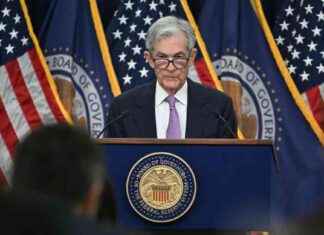Vice President Kamala Harris made headlines on Wednesday with her proposal for a 28% tax on long-term capital gains for households earning $1 million or more per year. This contrasts with President Joe Biden’s plan for a 40% tax rate, showcasing a rare divergence in economic policies within the Democratic Party.
Harris announced her tax proposal during a rally in North Hampton, New Hampshire, emphasizing the importance of incentivizing investment in American innovators, founders, and small businesses. This move signifies a departure from Biden’s budget, which included a higher capital gains tax rate of 39.6% for the 2025 fiscal year.
The current tax rate for long-term capital gains, assets held for more than one year, stands at a maximum of 20%. Harris’s plan aims to strike a balance between generating revenue and encouraging investment in the domestic economy.
Divergence in Economic Platform
Harris’s decision to propose a lower capital gains tax rate than Biden highlights a shift in her economic platform. While she has largely aligned herself with the president’s policies, this move showcases her willingness to chart her own course on certain key issues.
The Wall Street Journal was the first to report on Harris’s capital gains tax plan, which is expected to draw attention from both supporters and critics. By offering a more moderate tax rate compared to Biden’s proposal, Harris aims to appeal to a broader spectrum of voters and stakeholders.
Potential Impact on Business Growth
While Harris’s tax plan has received praise from some quarters, there are concerns about its potential impact on business growth. Representative Ro Khanna, a Democrat from California, expressed reservations about taxing unrealized gains, a key component of Biden’s economic agenda.
Khanna’s concerns center on the unintended consequences that such a tax policy could have on startup entrepreneurs and small businesses. By taxing unrealized gains for households with assets worth at least $100 million, there is a risk of stifling innovation and hindering economic growth in certain sectors.
Harris’s balancing act between supporting business interests and addressing corporate greed will be closely scrutinized as the presidential campaign heats up. As she seeks to differentiate herself from Biden and position herself as a champion of the middle class, Harris faces the challenge of navigating complex economic issues while appealing to a diverse electorate.
Republican Criticism and Counterattacks
Former President Donald Trump, Harris’s Republican opponent, wasted no time in criticizing her economic proposals. Trump has painted himself as the best candidate for the U.S. economy, contrasting his vision with what he calls “Kamala crash” if Harris were to be elected.
In a video posted to his social media platform, Truth Social, Trump warned of a potential economic downturn akin to the crash of 1929 if Harris’s policies were implemented. This rhetoric underscores the polarizing nature of economic debates in the current political landscape.
To counter these attacks, Harris has been proactive in presenting targeted plans to support businesses, especially in the lead-up to the upcoming debate against Trump. One such proposal announced by Harris is a $50,000 tax deduction for startup expenses for small businesses, a significant increase from the current level.
By focusing on initiatives to bolster small businesses and incentivize investment, Harris aims to strike a balance between addressing corporate greed and promoting economic growth. As the campaign progresses, her ability to articulate a coherent economic vision will be crucial in winning over voters and shaping the future direction of the country.
Analysis of Harris’s Economic Proposals
Harris’s economic proposals have sparked a debate among policymakers, economists, and the public. While her plan for a 28% capital gains tax rate has drawn attention for its moderate approach, there are lingering questions about its potential impact on different segments of the economy.
Proponents of Harris’s tax plan argue that it strikes a balance between generating revenue for government programs and encouraging investment in American businesses. By offering a lower tax rate than Biden’s proposal, Harris aims to appeal to a wider audience while also addressing concerns about excessive taxation.
Critics, however, raise concerns about the unintended consequences of taxing unrealized gains and imposing higher taxes on households with significant assets. There is a fear that such policies could discourage entrepreneurship, hinder innovation, and impede economic growth in certain sectors.
The debate over Harris’s economic proposals reflects broader discussions about the role of government in shaping the economy and the distribution of wealth. As the presidential campaign unfolds, voters will have to weigh the pros and cons of different economic policies and decide which candidate offers the best path forward for the country.
Future Implications and Challenges
As Harris continues to refine her economic platform and engage with voters, she faces a series of challenges and opportunities in the coming months. The upcoming debate against Trump will be a critical moment for Harris to articulate her vision for the economy and contrast it with her opponent’s policies.
By presenting targeted plans to support small businesses and incentivize investment, Harris aims to position herself as a candidate who can navigate complex economic issues while championing the interests of the middle class. How she navigates these challenges and communicates her economic vision will be crucial in determining her success in the presidential race.
In conclusion, Vice President Kamala Harris’s proposal for a 28% capital gains tax rate marks a significant departure from President Joe Biden’s plan and highlights the complexities of economic policy in the current political landscape. As Harris navigates the challenges of the presidential campaign, her ability to articulate a coherent economic vision will be essential in winning over voters and shaping the future direction of the country.








